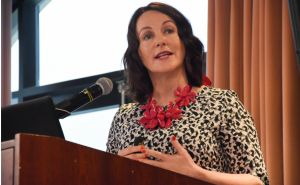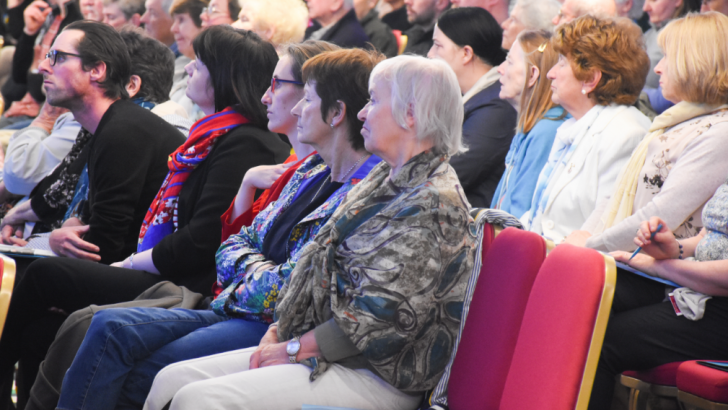Rebuilding a pro-life movement is a real challenge, but a vital one, writes Greg Daly
“I’ve decided that one year ago today was the lowest point in our nation’s history,” observed Maria Steen at The Irish Catholic Pro-Life Conference, continuing, “and while we are yet to see the full ramifications of abortion in our country – which will lag a little behind the vote – I feel that for the pro-life community, the only way is up.”
Describing herself as done with negativity around the depressing reality that a year ago our friends and families voted two-to-one to strip Ireland’s youngest and most vulnerable human beings of their last remaining legal rights, she said that in reflecting on where Ireland’s pro-life community finds itself now she wanted to send people away with hope – and some righteous indignation – in their hearts.
“I want to remind you that we’re in this for the long game, and that it is important that you take care of yourselves and each other,” she said. “It is time to regroup, to think prudently and carefully about how you choose to use your energy, your gifts for this cause.”
Stressing that the combination of hostile media and hostile government may make it seem an impossible task to turn things around, she said the challenge was to swell the pro-life ranks and to spread the realities of what abortion entails and the beauty of accepting and cherishing every single human life.
“We need to stop this talk in its tracks about whether a baby is wanted or unwanted – what does that matter? That is a bully’s charter – people only matter if they’re wanted, if they’re liked, if they’re popular. They only get to live if someone wants them,” she said, noting that what little scandal there has been on our airwaves over the recent abortion at Holles Street of a healthy child initially deemed to have had a life-limiting condition has been focused on the notion that the child would have been wanted and been allowed live if it had been healthy.
Recent e vents
In a wide-ranging talk that addressed how so many of the predictions pro-lifers made last year have been grimly fulfilled, she nonetheless stressed that Ireland is following a path well-worn in other countries, but said that recent events in the United States give grounds for optimism.
Optimism, though, not complacency. The first and most important way to increase support for pro-life policies and a more compassionate society is to ensure that we pass on these values to our own children and grandchildren, she said.
“That is where our first focus and efforts must be – nothing is more important. It is in our own homes where we have the possibility of creating our own culture and values, so make sure you do that,” she urged.
As a practical example of how a compassionate pro-life society can be built, Galway’s Emma O’Connell mapped out the ideas underpinning Gianna Care, which works to show that even if abortion is a legal choice, there are other choices – better choices – available.
Explaining how the organisation began with volunteers talking several years ago to women outside an Irish branch of Marie Stopes International, she said these volunteers included nurses, like Gianna Care’s founder Carolyn O’Meara, “and ordinary people who simply wanted to offer practical support to women to assist them in choosing life for their babies”.
The organisation now offers a range of services, ranging from scans and counselling to practical and financial aid, she said.
“We know from the research of the Guttmacher Institute, the research arm of Planned Parenthood themselves, that the primary reasons women choose abortion are lack of social and emotional support, and lack of financial stability,” she pointed out. Gianna Care tries to address both of these issues, and is certain that it has been involved in saving over 270 babies from abortion in Ireland, she added.
“This is a huge achievement for a group which receives no government funding or support, and is regularly attacked in the Irish media for its pro-life ethos,” she said, adding that following the closure of Cura, women in the West of Ireland had been left without supportive options in pregnancy, and that her own experience had taught her the value of Gianna Care.
“The challenge before us now is to work together on an exciting, new, people-powered media platform”
She expressed particular concern, however, at Government proposals that could deny women the chance to make last-minute choices that could help them keep their children alive.
“Simon Harris is currently rushing through another piece of badly thought-out legislation, which will create exclusion zones around hospitals and GPs surgeries,” she said. “This will stop groups like ours offering women options other than abortion outside these facilities and peaceful or prayerful vigils. This may also impact on our ability to advertise our service near or in doctors’ offices.”
Calling for this to be fought at local and national political levels, she said that donations and assistance to compete with the ironically named ‘MyOptions’ are vital, and that pro-lifers must work to rebuild a culture of life, not least by highlighting the positive work done by Gianna Care and other groups such as Every Life Counts and One Day More.
“A fightback in the media is required,” she said, citing the recent development of GRIPT media as an example of this.
***

Niamh Uí Bhriain of The Life Institute ran with this point, arguing that the media at large has effectively been an abortion campaigner in Ireland over recent years, with Pat Leahy of The Irish Times openly admitting at last year’s McGill Summer School that there had definitely been a media bias in favour of a yes vote in the 2018 referendum.
Many journalists had openly campaigned for repeal, she said, noting how on RTÉ’s website, the combination of the terms ‘Savita’ and ‘abortion’ yield19,800 results since 2013, in sharp contrast with the combination of the terms ‘Savita’ and ‘sepsis’ yielding just 66 results, and the 114 results found for the combination of ‘Savita’ ‘medical misadventure’.
Similarly, she said, in looking at the work of three journalists covering the referendum for The Times, of 60 ‘news pieces’, 90% were pro repeal. An examination of three years of coverage of the issue in The Irish Times found that of 312 articles in the self-proclaimed ‘newspaper of reference where there was a clear bias on the issue of abortion, fully 91% were biased in favour of abortion.
One of the great ironies around this issue, she said, is that while journalists are among the least-trusted professions in Ireland, people believe ‘the news’, and so, she said: “The challenge before us now is to work together on an exciting, new, people-powered media platform that people will want to follow.”
For Senator Rónán Mullen, “the future of the pro-life movement involves continued engagement with political issues in areas where it will be difficult to have victories in the short term but where in the longer term we can be successful”.
Stronger protection for conscience rights of doctors and other medical professionals needs to be a priority, he said, as does the need to require pain relief as a matter of basic human dignity where later abortions might be legal and taking place.
Never the answer
Another key area of activity would have to be education. “People may have given themselves ‘the right to choose’,” he said, continuing: “It is our job to help them ‘choose what is right’.”
Crucially, he said, the accompaniment of people in crisis pregnancy situations is vital. “While it is clear that abortion is never the answer, and that there is always a better answer, it is our duty to meet people where they are at and to help them find the strength and support that they need,” he said.
Calling for people to work on these issues on all fronts, including politics, he also said that while it is hugely important that values inspired by Faith be heard in the political system, it is also important to remember that “the values in which Christians believe can make sense to people of goodwill of all faiths and none and should be expressed in terms that can be understood by non-believers as well as believers”.
While politicians who have brought in abortion have done something terribly wrong, he said, nonetheless, pro-lifers must reach out and try to work with these people to make things better in the future. The reality, he said, is that given how our political culture has changed, “it is progress, not perfection, that we are working for”.
***
The last speaker at the conference was Carol Nolan TD, who held up changes in other countries that have experienced abortion as grounds for optimism.
“When we look to other jurisdictions, we see that the tide is turning back toward recognition of the precious value of human life,” she said. “They have seen the horror that emerges when the law is used to threaten human life instead of protect it. They have seen that what is often touted as freedom in fact leads to the worst kind of slavery and exploitation of women and unborn children.
“I have great faith that we too will come to see we have been manipulated through a dishonest political process that kept vital facts about the reality of abortion from us,” she said, adding that she had great faith in Ireland’s capacity to build a culture of life where “the fundamental dignity of the human person is front and centre”.
No denial
Even talk of the need to rebuild is a mark of courage, she said, an acknowledgement that there is no denial going on, and that pro-lifers are “not afraid to see how great the need is or how hard the fight will be”.
Likening the repeal of the Eighth Amendment to the fire that so recently ravaged Paris’s Notre Dame Cathedral, she said: “But something else happened as the flames burnt through Notre Dame. We were given a dramatic wake-up call. In the ruins we saw the value of the Cathedral even more clearly. The same has happened here.”
Recordings of the talks at The Irish Catholic Pro-Life Conference can be purchased from www.eist.ie


 Greg Daly
Greg Daly Attendees at the Pro-Life Conference. Photo Credit: Chai Brady
Attendees at the Pro-Life Conference. Photo Credit: Chai Brady 